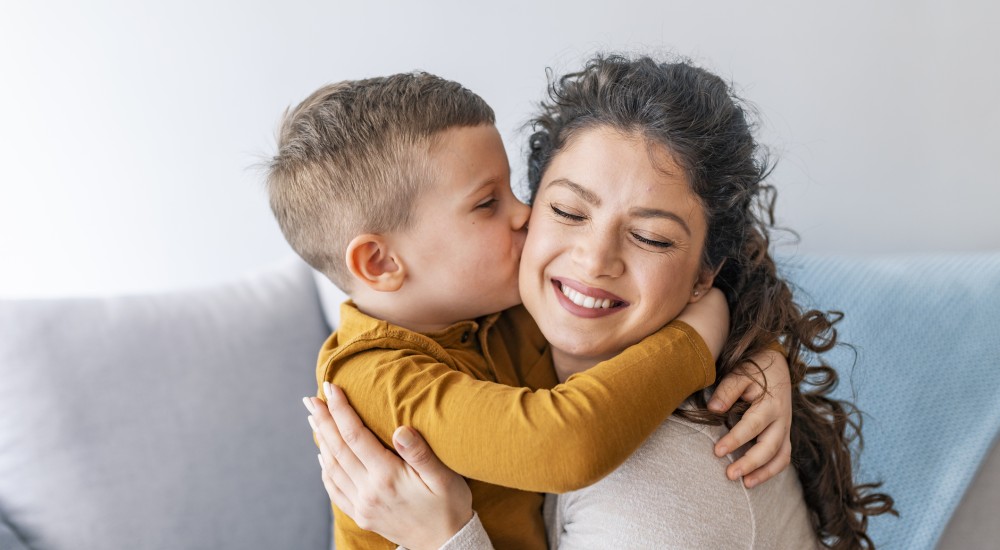
We teach our kids how to cross the road and tie their shoes, but do we give them the tools they need to give and receive love in a healthy way?
BC Children’s Hospital Child and Adolescent Psychiatrist Dr. Ashley Miller says many children learn by the old adage: monkey see, monkey do.
“One of the most important things a parent can do is model love and kindness in their interactions with others,” Miller says.
Whether it’s showing love for a family member, friend or partner, she says children often grow up and love others the way they were taught to love as a child.
Love can be expressed in a range of ways, including through touch, words, gifts, service and time. Children who are hugged more often tend to grow up happier. Kind words can clarify the implied love often shown throughout a busy day. A thoughtful gift can have meaning for both the person giving and the person receiving. Acts of service, including small chores or favours, can show care. Spending time with children, either by scheduling it or grabbing it when the opportunity arises, ultimately has the most long-lasting effect on children’s behaviour.
Love for the whole family
 Parents and children often make a point to show love for each other, but what about siblings or cousins?
Parents and children often make a point to show love for each other, but what about siblings or cousins?
“Children need to understand their siblings or cousins can be their lifelong friends,” says Miller. “It’s all about parents setting it up so that the kids know they are on the same team.”
Kids of similar ages naturally fight through the years, but they can be taught how to work their issues out.
“It’s good to show them how to get through a fight and not just blame each other,” says Miller. “Rather than seeing the other person as ‘bad,’ they should separate the action from the person and parents can help children build empathy for each other.”
Miller says children can be encouraged to help each other and make or brainstorm for gifts for birthdays or other celebrations.
And as much as possible, she says, everyone needs to preserve some screen-free time for connection. Relationships thrive when we can give each other the gift of our focussed attention.
Budding love basics
As kids get older, some teens may begin to try to find a partner to build a relationship with. It can be a tricky process that parents can help their children navigate.
“Parents need to be aware of how they are talking to their significant others,” says Miller. “Respectful communication and explaining how you are feeling is good behaviour modelling.”
And if that’s not possible, point out other relationships that are healthy and explain why you think they work.
Miller says it’s important not to just focus on sexual education, but to also talk about the basic characteristics of healthy relationships such as trust, honesty, humour, respect and communication. It’s good to focus on the positive, and also trust their instincts.
“A real relationship is based on respect and not just the validation that they are attractive – for example,” says Miller. “Oftentimes, teens are looking for intimacy that’s not sexual, but they can cross their own boundaries if they settle for sexual attention in the absence of love or caring.”
Texting or messaging on social media, which is often the first point of contact for teen relationships, can also throw a wrench into close connections.
“It’s easy to read something negatively,” says Miller. “They should try to talk in person to clarify. And if the way they are being treated doesn’t feel good, don’t continue with the hope that it will eventually turn around. Keeping someone else happy shouldn’t come before the teen’s own wellbeing.”
Also, says Miller, it’s imperative for parents to accept teens’ gender/sexuality (LGBTQ+) as a lack of acceptance from family members is proven to increase mental health challenges and suicide risk.
Showing the love for buddies
 Miller says, as in partner relationships, love for friends can also be a big focus in kids’ lives. It’s crucial to teach them to treat each other nicely and do favours for each other, but it’s also good to be aware how friends in their life affect their mood.
Miller says, as in partner relationships, love for friends can also be a big focus in kids’ lives. It’s crucial to teach them to treat each other nicely and do favours for each other, but it’s also good to be aware how friends in their life affect their mood.
“If a friend is bringing you down or causing you stress, something needs to change,” says Miller. “Encourage kids to talk to you about their friendships. If they’re having a problem, try to understand their point of view. Help your child understand the other’s perspective and work out ways to solve the problem.”
Carving out time to see a friend is a good way to show them they are special. Teach children to be aware of including everyone who wants to be included.
“Help kids think about what would make their friends feel good,” says Miller. “The saying still applies: treat others how you’d like to be treated yourself. Say kind words and be respectful.”







